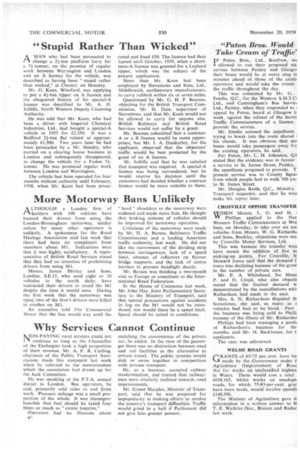Why Services C annot Continue
Page 42

If you've noticed an error in this article please click here to report it so we can fix it.
IMON-PAYING rural services could not 1 I continue so long as the Chancellor of the Exchequer took a high proportion of their revenue. Mr. A. F. R. Carling, chairman of the Public Transport Association made this statement last week when he referred to the' merribrandurn which the association had drawn up for the Jack Committee.
. He was speaking at the P.T.A. annual dinner in London. Bus operators, he said, primarily sold rides _ to and from work. Pleasure mileage was a small proportion of the whole. It was incomprehensible that fuel should be taxed four times as much as "exotic luxuries."
Operators had no illusions about matching the convenience of the private tar, he added. In the view of the passenger there was no distinction between road and rail facilities as the alternative to private travel. The public systems would sink or swim together in competition with private transport.
He, as a busman, accepted -railway modernization, and trusted that railwaymen were similarly inclined towards road improvements.
Mr. Ernest Marples, Minister. of Trans port, said that he was prepared for unpopularity in making efforts to resolve the country's transport difficulties. Traffic would grind to a halt if Parliament did not give him greater powers.




































































































